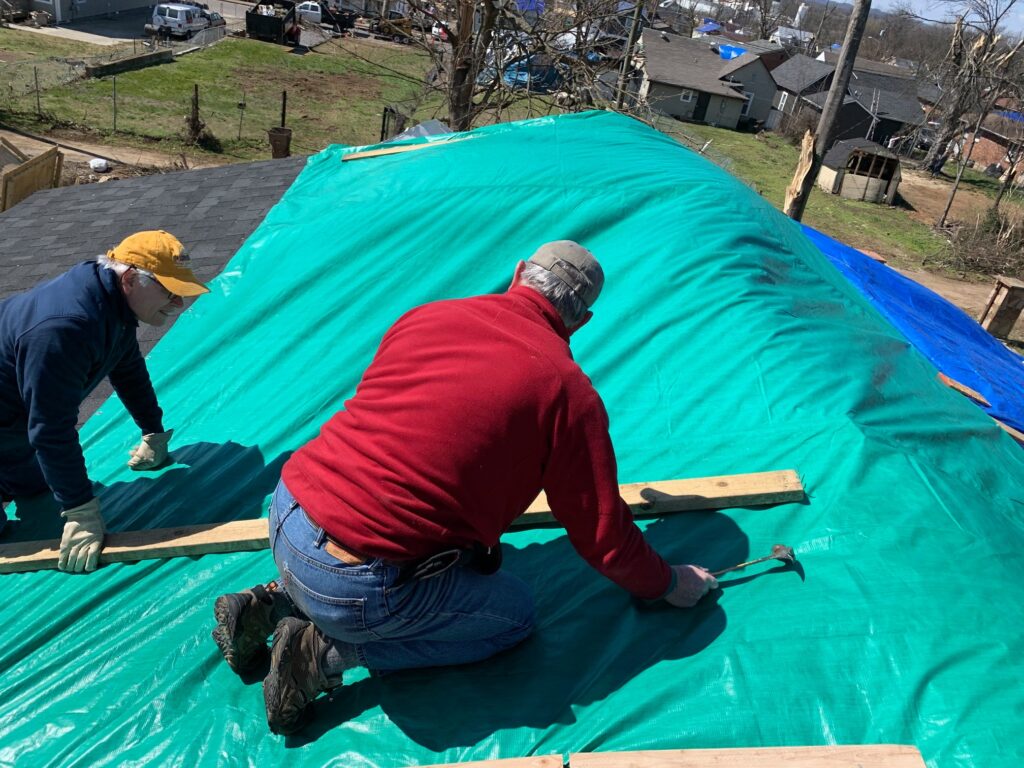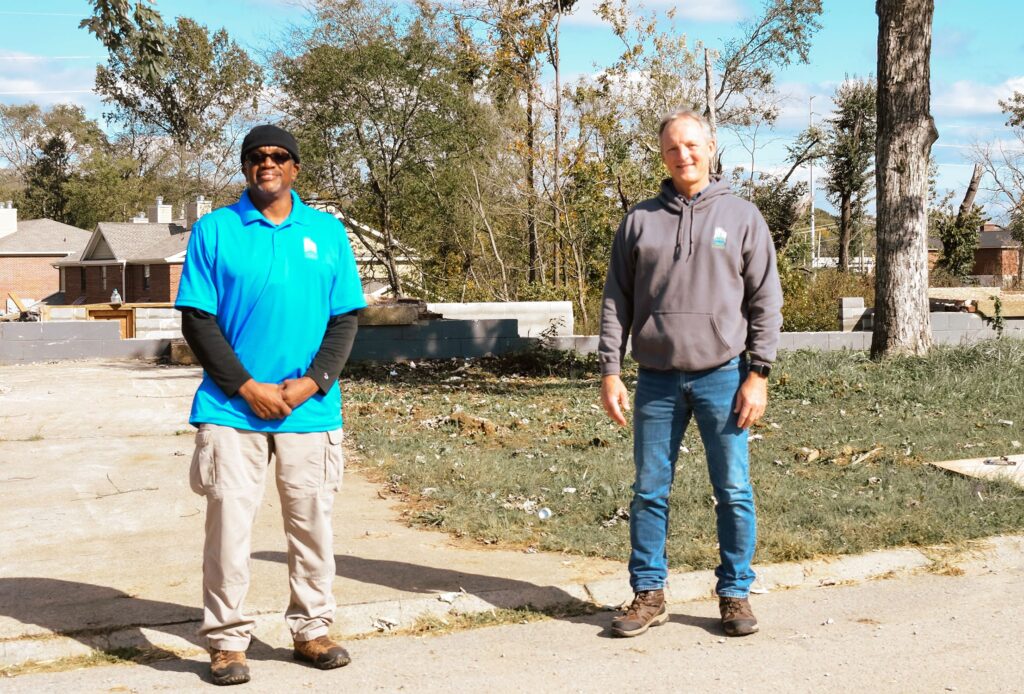UPDATED 03/01: The following story includes original reporting, as well as updated information provided by CFMT and Westminster Home Connection’s executive director, Keith Branson.
Westminster Home Connection begins by asking “What does it take for this person to age in place safely at home and with dignity?” The nonprofit provides critical repairs, mobility modifications, and sort-pack-move services.
Westminster Home Connection was founded after the devastating 2010 Nashville flood. With one construction supervisor, various subcontractors, and more than 1,800 local and visiting volunteers, the organization worked in more than 350 flood-damaged area homes. When the last home in case management was completed in 2013, it incorporated as Westminster Home Connection. Today, it serves older adults and persons with disabilities in various counties in West, Middle and East Tennessee. Between 2013 and 2019 it has empowered almost 2,000 people living in more than 1,200 homes.
Westminster Home Connection has received $144,500 in grants to provide direct expenses associated with the home repair/rebuild for tornado survivors in Davidson and Wilson counties.
First came the green and blue tarps, hammered in place with swift skill and deadline-driven determination rooftop upon rooftop in North Nashville.
A series of devastating and deadline tornadoes had torn through Middle Tennessee in the early morning hours of March 2-3, with North Nashville among the neighborhoods in their crosshairs.
Now, a few days, later, Mother Nature threatened rainstorms. There was much work to do to temporarily patch the gaping roofs, still open to the skies after the massive winds whipped shingles and timbers asunder, before the rains arrived.
A squad of volunteers, led by West End’s Westminster Presbyterian Church and its nonprofit construction organization Westminster Home Connection, arrived on the scene.

Dashed and damaged, these homes would remain dry, for now.
What Westminster Home Connection didn’t know then, nor did any of us, what was soon to follow the tornadoes and their terrible aftermath.
The coronavirus pandemic and subsequent quarantines measures soon overtook the region and the world. They of course remain as the arriving winter brings a whole new wave of infections and deaths that now number nearly a quarter-million people in the United States alone.
The Westminster Home Connection, their vital work for tornado relief and recovery suddenly slowed, pivoted to devising safety protocols to combat obstacles caused by the pandemic.
Nails continue to disappear, this time into fresh new timbers instead of tarps as the organization leads construction efforts to repair and rebuild homes in North Nashville and other neighborhoods.
Keith Branson, executive director of Westminster Home Connection since 2014, answered questions from The Community Foundation.

CFMT: How are you using, or planning to use, the tornado emergency response grant or grants?
WHC: Almost 2,200 owner-occupied homes in Davidson and Wilson Counties were damaged, and nearly 200 of those homes were destroyed. Many homeowners are working with their insurance companies and contractors to repair or rebuild their homes. Some survivors, however, will be not able to recover without assistance. Our three grants are for these survivors.
- Our first grant funded immediate needs and the start of establishing community construction resources.
- Our second grant is to convene and organize the not-for-profit construction agencies that will work with survivors who do not have the financial resources to recover without outside support. This grant pays for a fulltime Tornado Recovery Construction Project Manager. Clyde Kilgore has 13 years of experience from HUD (United States Department of Housing and Urban Development) and FEMA (Federal Emergency Management Agency) as a certified home inspector and insurance adjuster. Clyde assesses all tornado damaged homes that need community resources to recover. He prepares a scope of work and budget and assigns each home to a construction agency within the long-term recovery network.
- The third grant of $1,125,000 is for materials and labor for 150 homes. This grant is used by all the not-for-profit construction agencies that are repairing homes. As Westminster assigns a home to a construction agency, we match the CFMT dollars to the budget needed for that home. By having a consistent construction assessment and budget process, we plan to achieve our community’s goal of equity for all tornado survivors so that even the most vulnerable can recover.
CFMT: In light of changes in how we all live and work due to the COVID-19 coronavirus pandemic, how is your organization managing to work in supporting tornado relief and recovery efforts? What challenges have you all overcome or are overcoming?
WHC: The sweeping coronavirus pandemic forced us to pause and create safety protocols. This pause was incredibly untimely, as we had just started to evaluate the tornado work. We spent March through May working with individual survivors, connecting with other construction agencies, and becoming part of the long-term recovery groups. We have detailed guidelines for protection from COVID-19, and phases of work depending on the current spread of the virus in our community and other risk factors. In our ongoing program, we make critical repairs and mobility modifications to empower older adults and persons with disabilities to age-in-place safely.
In a pandemic, it’s even more important to have a safe place to live. We lost about two months of productivity due to COVID-19 but we have adjusted and are now almost as productive as we were before March.
CFMT: Give a favorite example or two of your staff stepping up to make a difference to help people through these disasters?
WHC: Clyde Kilgore and I went to a home that had been destroyed by the tornado. This was one of several cases where contractors who appear legitimate had run off with the insurance money after doing shoddy work or even no work at all.
While Clyde gathered background information about the tornado damage and contractor scam, then completed the assessment, the case manager and I sat with the homeowners, providing a comforting presence through tears and frustration over the tornado and subsequent scam.
With time and detailed explanations of Westminster Home Connection’s and the Tornado Recovery Connection’s commitment to faithfully walk with them through recovery until the end, this couple finally felt relief and hope in the process.
CFMT: In terms of tornado relief and recovery, what needs remain in your community or communities?
WHC: The need for advocacy and honest contracting remains. Even though Westminster has led the way in establishing multi-agency connections to form Long Term Recovery Groups, some tornado survivors have not tapped into this resource. Without the knowledge of experts, who have worked through previous disasters, homeowners do not stand as good a chance of successfully connecting with the not-for-profit construction agencies or hiring legitimate contractors who will restore their homes.
CFMT: Define the word “hope” for you and your organization.
WHC: Westminster was founded during the aftermath of the 2010 Flood. Having lived through that disaster experience, we strive to bring our community’s overarching objective for all survivors to return to safe and functional homes to the March 3rd tornado recovery work.
We will work until the last survivor in case management has recovered. Hope is our determination to leave no one behind. Hope is seeing a pile of rubble transformed into a home again. We fuel this hope with optimism, hard work, and collaboration so that nothing is impossible.
Follow up with Keith Branson, Executive Director, Westminster Home Connection
CFMT: From your organization’s perspective, what progress has been made since the March 2020 tornadoes, and what more still needs to be done for survivors?
WHC: Within the long-term construction groups in Davidson and Wilson counties, Westminster Home Connection convened the construction and rebuilding nonprofit organizations. In this role, we developed a framework for connecting construction agencies to the disaster case managers who work with the individual survivors on a recovery plan.
To date, Westminster has handled almost 50 construction referrals. We hired Clyde Kilgore, a certified home inspector and insurance adjuster with HUD and FEMA, to assess all owner-occupied tornado-damaged homes and to prepare a scope of work as well as a budget for each home. We assigned each home to one of the nonprofit construction agencies. Having a common assessment to determine the scope of work and budget for each house provides equitable allocation of community resources to survivors.
In the 2010 [Tennessee] flood, volunteers did much of the construction repairs. Due to COVID, there were virtually no out-of-town volunteer groups in 2020. Middle Tennesseans help our neighbors, and local volunteers and agencies have been and continue to be active. In addition, much of the tornado construction work is being done by paid contractors.
Initially, we expected that many more owner-occupied homes would need assistance. But tornado damage, unlike flood damage, is typically covered by homeowner’s insurance. Most of the owner-occupied homes damaged by the tornadoes were insured.
The homes that needed community assistance for repairs fall into these categories:
- Underinsured: The home was insured, but the policy didn’t cover some of the work needed to bring the home to a safe and functional condition. For example, insurance might not cover tornado damage attributed to an underlying condition, such as termite damage. In that case, the survivor would have a shortfall in their ability to repair the home.
- Contractor Issues: Contractors did shoddy work or even disappeared with deposits without doing any work at all. Another contractor issue is pricing. Construction is booming in Middle Tennessee, and contractor prices have risen significantly since March 2020.
- Uninsured: Some homes were uninsured because the home had been in the family for many years and didn’t have a mortgage, the survivor had limited income, etc.
Some survivors did not qualify for assistance with home repairs because they decided to sell instead of repairing the home.
As for what more needs to be done, Westminster and the nonprofit construction agencies are still here and available for tornado survivors. With COVID at the same time as the tornadoes hit, it’s been difficult to find tornado survivors and connect survivors with resources. The Long Term Recovery Groups has canvassed the neighborhoods several times and analyzed data to find survivor households. We are actively searching for any homeowners who need home repairs. You can connect us through the Tornado Recovery Connection at 615-270-9255.
Learn more about Westminster Home Connection
Online at www.westminsterhomeconnection.org.